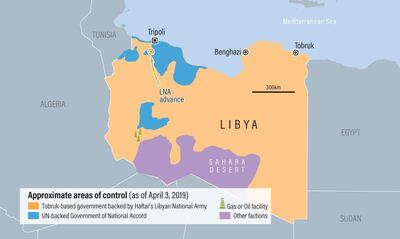The United States withdrew military forces from Tripoli on Sunday amid fighting in the city and the United Nations appealed for a two-hour ceasefire to move civilians and wounded fighters to safety.
As Libyan commander Khalifa Haftar continued his offensive to capture the capital, the US Africa Command said it had relocated "a contingent of US forces" in what was the first American acknowledgement that it had forces in Libya.
The US statement did not give details about the size of the force, or how long it had been there, but said it was considering returning the units to Libya when the situation stabilised.
Field Marshal Haftar’s Libyan National Army offensive entered its fourth day, with both sides using air strikes.
Libya is divided between the UN-backed Government of National Accord in Tripoli and the eastern House of Representatives in Tobruk, for whom the LNA is fighting.
The GNA Health Ministry said in a statement on Sunday that clashes in the southern part of the capital killed 11 people and wounded 23.
The ministry gave no details about whether the casualties were civilians or fighters.
GNA jets bombed LNA units on the outskirts of Tripoli, while LNA planes bombed sites in the east of the city.
The LNA said four of its positions were targeted but the bombs missed their targets.
There was no sign either side would agree to the UN's call for a two-hour truce.
Fighting continued around the international airport on the south-west outskirts of the city.
LNA units patrolled near the airport, which has been abandoned since 2014.
A soldier from eastern Libya displayed a red football shirt of a Benghazi football team as a sign of the LNA's control of the airport.
Citizens in some neighbourhoods cheered and waved as LNA forces arrived.
LNA spokesman Col Ahmed Al Mismari said 14 soldiers were killed in the fighting and that the LNA had taken control of territory south of the capital, including the strategically important town of Gharyan.
The GNA Prime Minister, Fayez Al Sarraj, announced a counter-offensive and accused Field Marshal Haftar of betrayal after meetings between the men this the year, in which they committed to finding a political solution to the conflict. They have met several times over the past two years.
“We extended our hands in peace but this assault by Haftar’s forces will be met only with decisiveness and force,” Mr Al Sarraj said.
There are concerns for civilians trapped inside Tripoli and for thousands of migrants in detention centres.
“The safety of migrants in detention is especially concerning should there be an escalation in military action,” said Antonio Vitorino, director general of the International Office of Migration.
Calls for a political solution came from Cairo, where Russian Foreign Minister Sergey Lavrov met his Egyptian counterpart Sameh Shoukry.
“Egypt has supported from the beginning a political agreement as a tool to prevent any military solution,” Mr Shoukry said on Saturday.
The concern for some diplomats is why Field Marshal Haftar chose to attack Tripoli now, less than two weeks before UN brokered peace talks scheduled to begin on April 14.
The National Conference, as it is known, was intended to find consensus before elections scheduled for later this year.
The peace process began in May 2017, when Field Marshal Haftar met Mr Al Sarraj in Abu Dhabi.
A year later, the two men met again in Paris, alongside the Speaker of the House of Representatives in Tobruk, Aguila Saleh, and GNA High Council of State chairman, Khalid Al Mishri.
Field Marshal Haftar is Tobruk’s military commander, and the eastern parliament has endorsed his military campaign. In Paris, the four men agreed to hold elections.
The UN wanted to hold them last December, but those plans were abandoned after Field Marshal Haftar and Mr Al Sarraj met in Palermo last November.
The sticking point at that meeting was the field marshal’s demand that Tripoli's militias disband. The government has no military forces of its own and relies on the most powerful militias for security.
Optimism returned to the peace process on February 27, when the UAE hosted another meeting between Field Marshal Haftar and Mr Al Sarraj. Again they committed in principle to hold elections.
But Field Marshal Haftar had in January launched an offensive to capture the south of Libya, which he achieved by last month.
That offensive has given him and the parliament in Tobruk control of about three quarters of Libya and most of its oilfields.
The UN insists the National Conference will go ahead as planned, but whether Mr Al Sarraj and Field Marshal Haftar will attend is unclear.


